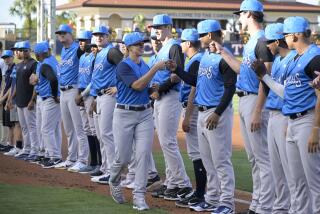It Increasingly Appears the Season Is Lost : Baseball: Federal mediators see no reason to bring owners, players together for negotiations at this time.
- Share via
Federal mediators met separately Wednesday with negotiators for baseball’s club owners and striking players, and determined that there was no reason to bring them together for further bargaining at this time. There have been only two negotiating sessions since the players went out on Aug. 12 and none since last Thursday.
The calendar now reads September, and what remains of the 1994 season is about to go under.
“There is nothing scheduled and no reason to believe anything will be scheduled soon,” said Donald Fehr, the union’s executive director. “The mediators are out of ideas too.”
Fehr confirmed a story that appeared in Wednesday’s editions of The Times, saying he has had informal contact with an owner, Jerry McMorris of the Colorado Rockies, but wouldn’t discuss the nature of their talks. He did not classify them as secret negotiations and maintained that nothing substantive has emerged.
On Day 20 of the strike, mediators met in New York for more than three hours with representatives of the owners, then spent only 15 minutes with the union’s staff, assured that there has been no change in the union’s resistance to a salary cap and no indication that the owners plan to withdraw it.
Owners’ negotiator Richard Ravitch said: “I’m optimistic by nature, but I have nothing more than nature to base it on.”
Ravitch said the union’s ongoing refusal to discuss issues of cost and how revenue can be divided on a percentage basis is inexplicable and that the losses being absorbed by the clubs because of the strike significantly reduce the amount of money they will have to spend on player compensation next year.
That sounded like a threat, but Ravitch said the $1 billion guaranteed the players in the owners’ proposal--based on a 50-50 split of all revenue--would still be there if the players accepted the proposal.
In that case, he said, the owners would have to reduce other expenditures to compensate for strike losses, which could exceed $200 million if play is not resumed.
Ravitch also said the $140 million that the owners had at risk in postseason TV revenue is now less than that since advertisers, concerned about the uncertainty of the playoffs and World Series, are spending their money elsewhere.
That situation is so bleak, sources said, that the postseason--barring a settlement--could be buried by the end of next week.
Both Ravitch and Fehr said their constituents understood the risks of their respective courses. The players missed their first full paycheck Wednesday. First distributions from their $175-million-plus strike fund will be mailed on Sept. 15, a normal payday.
“The players understood that a strike costs the industry money and costs them money, and that’s an indication of how strongly they feel (about a salary cap),” Fehr said.
The cap, Texas Rangers pitcher Kevin Brown said Wednesday, is not an option “this year, next year or in 1996,” meaning the union is prepared to stay out indefinitely, as Fehr has predicted, if the owners unilaterally put it in place.
Acting commissioner Bud Selig said the prospect of the strike continuing in 1995 is a “grave concern,” but the long-term consequences of failing to establish a system of cost certainty would “be even graver.”
More to Read
Go beyond the scoreboard
Get the latest on L.A.'s teams in the daily Sports Report newsletter.
You may occasionally receive promotional content from the Los Angeles Times.










